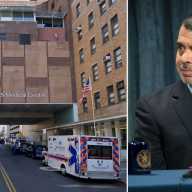When the St. Luke’s Chamber Ensemble’s
Second Helpings Series concludes its 2000-2001 season at Manhattan’s
Dia Center for the Arts on June 2, it’ll be with "Crosstown
New York," a concert of works by composers with a relationship
to New York City.
The most famous name on the list is Tan Dun – the recent Oscar
winner for his scoring of "Crouching Tiger, Hidden Dragon"
– whose "Intercourse of Fire and Water" will be played.
And although there will be music from Julia Wolfe ("Four
Marys") and Mario Davidovsky ("Quartetto No. 2"),
the name on the program that will appeal most to Brooklynites
is Elizabeth Brown.
Brown, a Juilliard graduate who has been composing since the
1970s, moved to Park Slope about five years ago, and finds her
chosen surroundings amenable to her chosen profession.
"We have a beautiful garden with an arbor in the back,"
the composer told The Brooklyn Papers. "I just love to do
much of my writing outdoors, so any time of day or night, weather
permitting, I can do my composing outside, say from April to
November."
The St. Luke’s Chamber Ensemble will perform the world premiere
of Brown’s "Blue Minor," a flute quintet (flutist plus
string quartet) that the ensemble commissioned.
"When I got the commission, I was able to say what instrumentation
I’d write for," Brown said. "And being a flutist myself,
I usually think in terms of flute when I write. The flute is
not so much a solo instrument in this piece, but it’s very much
part of the ensemble."
Since there’s more precedent for a flute quartet, Brown first
thought along those lines. "There’s the Mozart Flute Quartet,
and since that one is programmed so often, I thought first of
composing a quartet, thinking that maybe my piece would be programmed
in conjunction with it," said Brown.
"But for this particular event, I had the opportunity to
write for string quartet with the flute, and so many of the ideas
I was having just worked better with that instrumentation. So
I decided to go with the quintet for musical reasons."
The quintet’s title, conversely, came about in a purely non-musical
way. "’Blue Minor’ is a title a writer friend of mine and
I came up with over a nice dinner, after a few glasses of wine,
thinking about my music in general," Brown said.
"I’m primarily a chamber music composer – small, intimate,
personal works," she noted. "My style is sort of lyrical
and melancholy, I would say. I’ve written a lot for exotic and
non-Western instruments, and I’m a birdwatcher, so I’ve been
influenced by birdsong. I use a lot of microtonal effects, but
I’m predominantly a tonal composer, and I work in classical forms."
In other words, Brown’s music is quite evocative and eminently
listenable.
"Blue Minor" bears a dedication to the composer’s father,
Lavern Brown, who died last year at age 78. "My dad was
a farmer, and he always hoped I’d be happy in whatever I did.
But he wasn’t musical in any way, and he was probably baffled
by my choices."
Later in life, father and daughter were able to connect on a
different level. "I was raised in Alabama, and when I finally
got my garden after moving to Brooklyn, I could talk to my father
about many things," she said. "Anything botanical I
wanted to know I could talk to him about.
"And my four movement titles [’In the Deep Bare Garden,’
’Alone,’ ’Be Still’ and ’Listening to the Evening’] refer to
that."
Brown’s current composition has ties to the borough she now calls
home.
"I’m actually working with a Brooklyn poet, Sharon Nesmer,
on a piece that’s called ’Mysterious Brooklyn: Vignettes and
Interludes,’" she said. "Sharon has written little
vignettes about everyday life in Brooklyn – you know, the weirdness
of it."
But please don’t think that Brown and Nesmer are dissing their
beloved borough.
"Sharon’s writing is already weird, and the theremin just
makes it more of what it already is, so that’s why I’m using
it." The theremin is the eerie-sounding electronic instrument
named after its Russian inventor, engineer Leo Theremin, which
was a staple of bad sci-fi film soundtracks in the ’50s. Brown
will play the instrument by altering the electromagnetic field
between its two antennae with her hand.
"It should be fun," she said.
"Crosstown New York" will
be performed at 2 pm on Saturday, June 2 at the Dia Center for
the Arts, [548 West 22nd St., Manhattan, (212) 594-6100]. Tickets
are $20, $10 for students, seniors and Dia members. The ticket
price includes admission to the galleries and a post-performance
reception with the composers and artists.

























